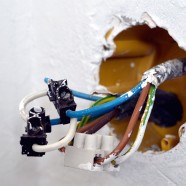How to Choose the Right Electrical Contractor for Your Needs
If you’re looking for an electrical contractor in south Florida, you’ll find a confusing array of companies to choose from. How do you find the right electrical contractor for the job? You could Google “electrician” and hope for the best, but that’s not likely to get great results. A little bit of research and common sense questions will go a long way toward finding the right contractor for your particular electrical project.
Your Project
Figuring out what you need to have done will go a long way toward deciding which electrical contractor is right for you. If you’re looking to add lightning protection to your residential electrical system you’ll need an electrician with different experience and education than one who specializes in adding backup power supplies to large businesses. Your electrical contractor in south Florida will probably have experience in multiple areas, but no one can specialize in every aspect of a job. Narrowing down the scope of your proposed project is the first step in deciding which contractor to hire.
Experience on the Job
Knowledge and experience go hand in hand when it comes to technical jobs. The longer an electrician has been actively working, the more situations he has dealt with and the more types of jobs he’s successfully completed. No job site ever went perfectly smoothly, so having an experienced contractor on the job increases the odds that he’s seen the problems before and know how to deal with them. Experienced electrical contractors also know enough about different jobs to give you advice in the planning stage of your project. Whether you’re looking for energy savings or a simpler way to do a job, a contractor with a proven track record has the knowledge to give you intelligent advice.
Paperwork
Ask any prospective contractor to provide you with copies all pertinent paperwork related to the job. These will include:
- Electrician’s license
- Specialty job certificates such as for State Licensed Gas Contractor
- Insurance paperwork, both for your job and the workers on site
- Certificates of completion from any specialty education he may have
If a contractor refuses to give you copies of any of these when asked, turn and walk away no matter what discounts or deals he offers. A deal isn’t a deal if the work is shoddy, or worse, dangerous.
The Workers
Once you hire an electrical contractor in south Florida, how can you be sure who is working in your house or business? Does the electrician have a crew he works with on a daily basis, or will he be contracting out some of the work. There’s nothing wrong with subcontractors, especially when it comes to specialized jobs, but it’s a good idea to know who will do the job ahead of time. The contractor’s insurance may not cover subcontracted labor, he will most likely not have done background checks on them, and unless it’s a team he works with frequently he won’t be able to vouch for them.
If all the work will be done by the contractor’s employees, ask if he’s done background checks on them, how long he’s been working with each person, and the experience of each worker. You’re going to let these people in your home or business; you have the right to know exactly who you’re letting inside.
References for An Electrical Contractor in South Florida
Any experienced electrical contractor with a history of satisfied customers will be happy to provide you with references. Once you have the list in hand, call or email each person on the list and ask about their experiences with the contractor. Find out about the length of time the job took, whether the contractor did what was promised, and whether they were satisfied with the job. Knowing a contractor has a long string of successful prior jobs is a great indication that he’ll do a good job for you, as well.
Read More7 Great Kitchen Lighting Ideas to Consider
One of the least expensive ways to make a big impact with your home renovation project is by changing your kitchen lighting. By just switching out the lamps and adding new lights in different places, you can completely change the mood of the room. Go from plain to pizzazz by trying one of these unique kitchen lighting ideas:
Idea #1: Under Cabinet Lights
Install a set of lights underneath your kitchen cabinets. These lamps add ambient light to the room, plus can serve as task lighting for kitchen prep work. Attach the electrical wiring against the bottom of the cabinet and you can have the entire system installed without drilling holes or breaking into the walls. A modern looking makeover for minimal money, this decorating scheme is as practical as it is attractive. It’s most effective if you use smaller lights that hide behind decorative molding, beaming down on the counter without being seen.
Idea #2: Use Chandeliers
The more elaborate, the better. Be it crystal or stainless steel, modern or antique, a chandelier adds just enough personality to make your kitchen pop. This option is great if you’re renovating your kitchen. You can have your residential electrical contractor install this instead of the same old boring kitchen lights that have graced every ceiling you’ve seen since childhood. Chandeliers are just different enough to show off your decorating style, yet they do the job of lighting up the room perfectly. Bright enough to light kitchen tasks and large enough to spread ambient light throughout the room, look to living room lighting fixtures to find your next kitchen lighting.
Idea #3: Set the Stage
Every kitchen’s got a few spots that get all the attention: the sink, that portion of the counter that holds a cutting board perfectly, maybe a spot right next to the oven. Instead of relying on ambient lighting to get the job done in these spots, install some bright task lighting dedicated to lighting up these areas. Have your contractor install them on separate switches so you can turn them on only when needed. You’ll have a safely lighted area for cutting and other kitchen duties.
Idea #4: Go Eclectic
Can’t decide which lamp you like the best? Why choose? Pick one similar element like creamy shades or brass fixtures and install a variety of hanging lamps that almost go together. Not for formal dining rooms and kitchens, the eclectic lighting scheme fits in with free spirits and confident decorators. This combination often looks like a custom designer did a rich decorating job on your home. Only you will know the truth.
Idea #5: Battery Back-Ups
Home renovations in south Florida, especially those in kitchens and other frequently-used parts of the house, often include lighting that works during one of the many power outages that the area is known for. Emergency lighting doesn’t have to look like the lamps on your corner store’s wall.
Idea #6: Go Retro
Haunt thrift shops and yard sales for old kitchen lighting fixtures from the 60’s or earlier. Vintage is hot, and it might even inspire you to redo your kitchen with an entirely new retro theme. Have a residential electrical contractor inspect the fixtures to make sure they’re safe and in good working condition before he installs them in your room. If the wiring is worn, get the lamps repaired, leaving the decorative outside alone.
Idea #7: Made in the Shade
Give your kitchen makeover a pop of color. Get rid of the plain old white shades that every kitchen fixture has. Paint yours a bright primary color or something in a deep jewel tone. Decoupage designer fabrics to the outside. Glue on bright coins or small game pieces. Turn your lighting into a conversation piece simply by adding a crafty shade filled with your personality.
Read MoreComparing a Standby Generator With a Portable Generator
Power outages are a fact of life in Florida, where there are more lightning strikes per square mile than in any other state. While most blackouts last an hour or less, enough of them last longer that it can become a significant problem. If you have health issues or run a business that relies on a constant source of electrical power, a power outage can be a real danger. This is where a backup power supply comes in.
Backup supplies come in two forms: a standby generator and a portable generator. Both of them convert fuel into electrical power to keep the lights and appliances running on your property. Although a portable generator is less expensive to own, it isn’t a good choice for backup power in your home or business. Unlike portable generators, a built-in standby generator is built for long time use.
Powering a Generator
Portable generators run on gasoline which has to be stored on your property if you want to have it on hand when the power goes out. In a blackout, the pumps at the gas station won’t work, so you have to store your supply ahead of time. This is dangerous many even be illegal in your community. In addition, a portable generator will need to be refilled every few hours, during bad weather or even in the middle of the night.
A standby generator, on the other hand, will run for days on either natural gas or propane. Either one of these fuels is readily available in the absence of electrical power, and you don’t have to worry about dangerous storage problems or about gas getting stale and having to be replaced. The generator will turn itself on when the power goes out, and you don’t have to worry about keeping a fuel supply running to the unit.
Generator Safety
Portable generators can never be run indoors or directly up against your building. They have to be faced away from your structure and an extension cord is used to run power from the unit into your house or business. Combine frequent refueling with extension cords stretching across your property in bad weather and you’ve got an uncomfortably dangerous situation.
With a standby generator, toxic fumes aren’t a concern because your electrical contractor will permanently install it a safe distance from your building. There’s no need to worry about fueling because it will be permanently attached to your home fuel supply. Instead of needing dangerous extension cords strung across your yard, a permanent electrical installation will keep your standby generator attached to the building and ready to supply power when needed.
Risk of Theft
It’s a sad fact but during long-term power outages, one of the biggest problems is people stealing portable generators, usually in the middle of the night. The loud noise is a tip-off to would-be thieves, as are the bright lights shining in an otherwise dark neighborhood. All a thief has to do is to unplug the extension cord and wheel your portable generator away.
If you have a standby generator built into your property, theft won’t be an issue. They’re much less noisy, but, more importantly, yours will be permanently attached to your power and gas lines as well as the base foundation. Thieves like easy work, and pulling out a heavy standby generator is the last thing they’ll want to do when an easy portable unit is probably available somewhere in your neighborhood.
Read MoreReasons to Replace Older Electrical Wiring in Your Home
As long as the lights are shining and the air conditioning is working, most people don’t give the wiring in their home a second thought. Unless you’re the original owner of your house, you’ve got no way of knowing everything you should about the electrical system in your home. Electricians tend to replace what’s needed and worn out, leaving the rest behind in a piecemeal fashion. The result is usually a mixture of old and new wiring with varying abilities to run the appliances you have in your rooms. Replacing the older electrical wiring might be an obvious choice once you start having problems, but there are reasons to renew your system before you start to see troubles.
Room Renovation
When you’re redoing a room in your home, it’s the perfect time for an electrical renovation. Contractors will be knocking down interior walls and making over the interior of your home, why not improve the workings inside as well? It’s the easiest time to replace electrical wiring, since your contractor won’t have any wallboard in the way, and it’s much simpler to find out the condition of the wiring that’s already installed.
Fire Hazards
Worn electrical wiring is one of the most common causes of house fires. If the electrical wiring in your home is cracking, fraying, or falling apart in some other way, the exposed wires cause a real danger of sparking and catching home materials on fire. Here are some of the most common warning signs:
- Frayed wires with the covering cracked or broken and the interior wiring exposed
- Outlet scorch marks. Outlet covers should be cool to the touch. Warm or hot spots usually mean a short in the wire behind the outlet plate.
- Dimming lights when you plug in the vacuum or use the microwave
- Rodent problems. If you’ve had trouble with mice or rats, take the time to inspect your wiring. Rodents love to chew on the coverings of residential electrical wiring
- Circuit breakers tripping. Once is an annoyance. Multiple times means your wiring isn’t up to handling the load you’re asking it to carry
Economics
If you’re going to have your wiring replaced, doing it during a home renovation is the least expensive time frame in which to do it. You won’t have to pay for any demolition needed to get to the wires, and wall repairs have already been budgeted. Upgrading your wiring to a more modern system can save you money in other ways, too. Upgraded systems with the correct amount of outlets can handle home usage easier and will send fewer surges through the system. This can save you thousands of dollars in computer costs if you don’t have an upgraded surge protector installed.
Modern Usage
Think about the electrical appliances you use every day compared to even 10 or 20 years ago. Today’s family typically has at least one computer that runs almost all day as well as HDTVs, elaborate stereo systems, smart appliances, and other belongings that use electricity in increasing amounts. Older wiring was never made to handle these loads, and will short out if asked to cover these loads for any period of time. Upgraded circuit breakers will handle overloads and surges, which additional lines and dedicated systems provide extra computing power for families with multiple work stations for work and school research.
Read More




Recent Comments